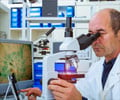Genetic roots of a cancer patient has been completely decoded by Washington scientists for the first time .
Washington University scientists have for the first time decoded the complete DNA of a cancer patient, and traced her disease to its genetic roots.
The breakthrough resulted from the efforts of a large research team at the Genome Sequencing Center and the Siteman Cancer Center at Washington University School of Medicine in St. Louis.The researchers have revealed that they have sequenced the genome of a woman in her 50s who ultimately died of acute myelogenous leukemia, a cancer of blood-forming cells in the bone marrow.
They say that the objective of their research was to identify genetic changes unique to the woman's cancer.
With this advancement, according to the research team, scientists can now think of using a more comprehensive, genome-wide approach to study the genetic basis of cancer.
"Our work demonstrates the power of sequencing entire genomes to discover novel cancer-related mutations. A genome-wide understanding of cancer, which is now possible with faster, less expensive DNA sequencing technology, is the foundation for developing more effective ways to diagnose and treat cancer," Nature magazine quoted Dr. Richard K. Wilson, director of Washington University's Genome Sequencing Center, as saying.
The study has uncovered 10 genetic mutations in the patient's tumor DNA that appeared to be relevant to her disease.
Advertisement
They also said that virtually every cell in the tumor sample had nine of the mutations, and that the single genetic alteration that occurred less frequently was likely the last to be acquired.
Advertisement
AML arises from mutations that accumulate in people's DNA over the course of their lives, but little is known about the precise nature of such changes, and about how they disrupt biological pathways to cause the uncontrolled cell growth that is the hallmark of cancer.
In their latest study, the Washington University researchers sifted through the three billion pairs of chemical bases that make up the human genome to pull out the mutations that contributed to the patient's cancer.
"Until now, no one has sequenced a patient's genome to find all the mutations that are unique to that person's disease. We didn't know what we would find, but we felt that the answers to why this patient had AML had to be embedded in her DNA," says Dr. Timothy Ley, a hematologist and the Alan A. and Edith L. Wolff Professor of Medicine.
Geneticist Francis Collins, former director of the National Human Genome Research Institute, said: "The determination of the first complete DNA sequence of a human cancer genome, and its comparison to normal tissues of the same individual, is a true landmark in cancer research.
The researchers are presently sequencing the genomes of additional patients with AML, and planning to expand the whole-genome approach to breast and lung cancers.
Source-ANI
SPH















